Why EV Charging at Home is Taking Off
Charging station installation is becoming a top priority for electric vehicle owners, and for good reason. Over 80% of EV owners charge at home, making it the most convenient and cost-effective way to keep your vehicle ready to go.
Quick Answer: Charging Station Installation Steps
- Assess your electrical system – Check if your panel can handle the load
- Choose the right charger – Level 2 (240V) for most homes
- Get permits – Required for dedicated circuits in most areas
- Hire a licensed electrician – Essential for safety and code compliance
- Install and test – Professional setup with final walkthrough
The numbers tell the story: experts predict 35 million EVs will be on U.S. roads by 2030, with roughly 28 million charging ports needed at homes across the country. Like charging your phone overnight, home EV charging lets you “set it and forget it” until morning – you’ll wake up to a fully charged vehicle and peace of mind.
But here’s the thing: charging station installation isn’t a DIY project. These are high-voltage appliances with similar electrical requirements to your clothes dryer or stove (240 volts/30 amps). Getting it wrong can mean electrical fires, code violations, or voided warranties.
I’m Jesse Burnett, a Master Electrician and founder of Dr. Electric CSRA, with over 1,200 completed jobs including numerous EV charging station installations throughout the Central Savannah River Area. My team and I have helped dozens of Augusta homeowners safely transition to electric vehicle ownership with professional installations backed by our 5-year workmanship warranty.
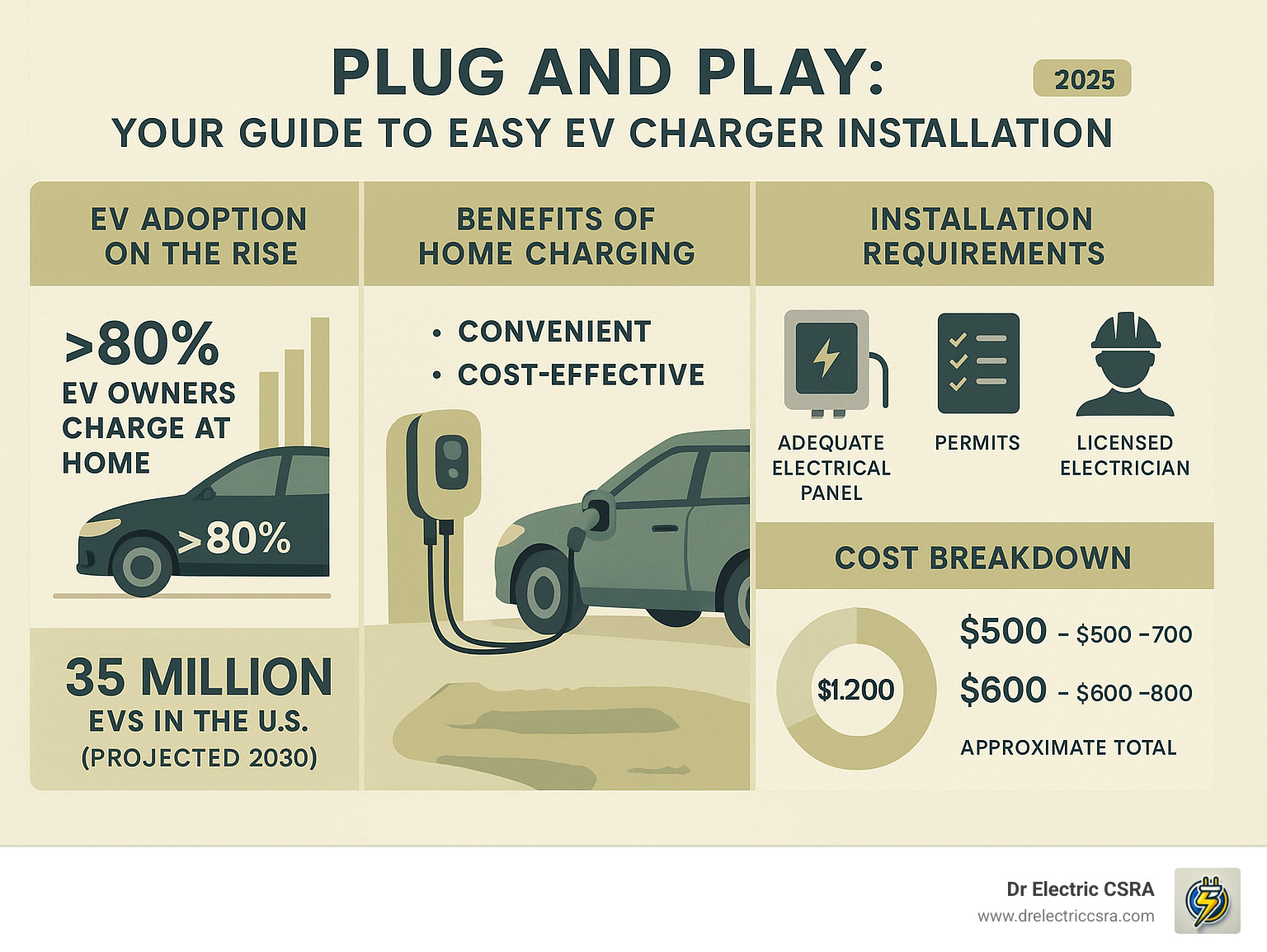
Key terms for charging station installation:
Understanding Your Home EV Charger Options
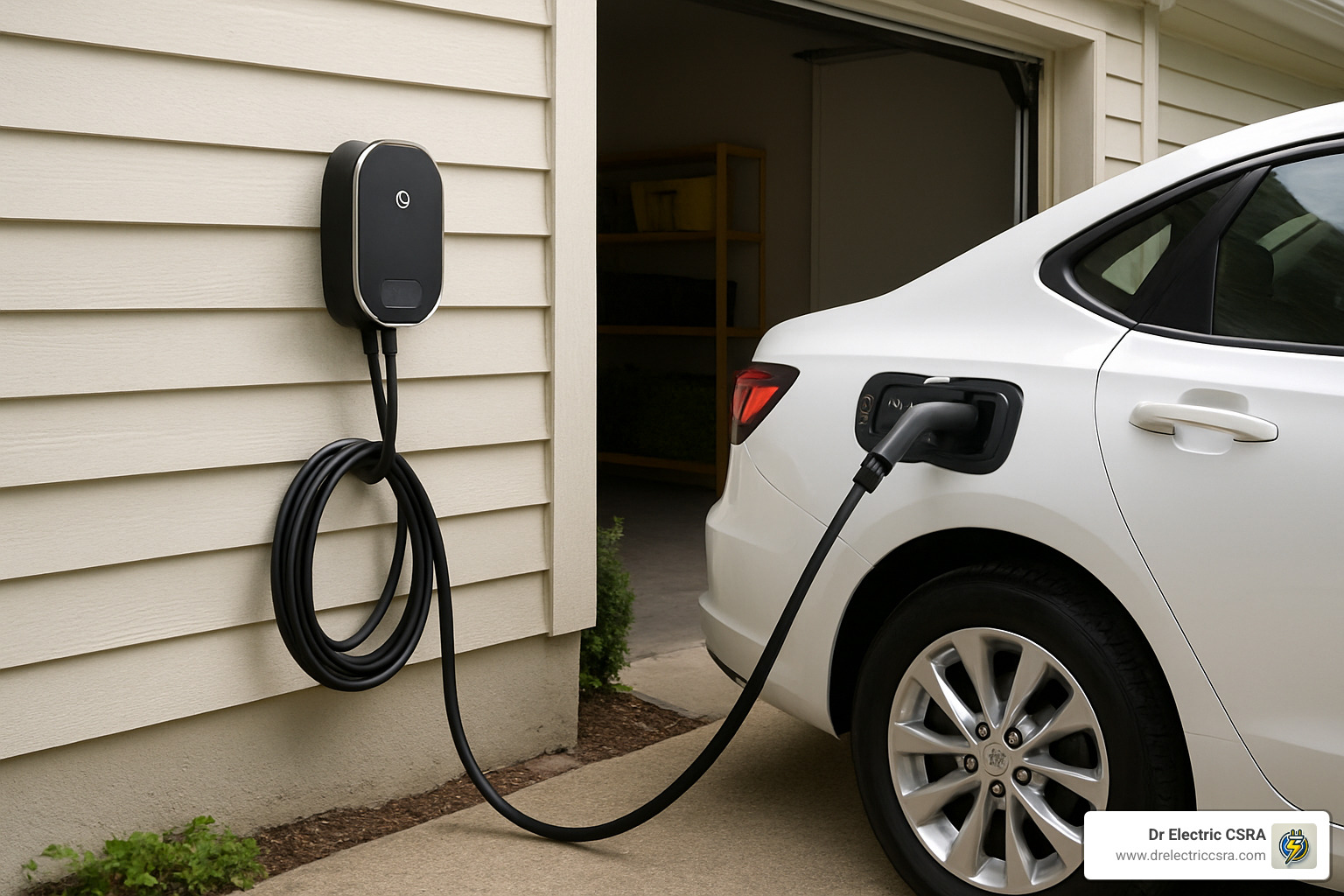
Let me clear up some confusion right away. What most people call an “EV charger” is actually called Electric Vehicle Supply Equipment (EVSE). The real charger is built into your car – the EVSE is like a smart electrical outlet that safely delivers power to your vehicle.
Think of your EVSE as a translator between your home’s electrical system and your car. It constantly communicates with your vehicle to make sure everything stays safe and efficient. This back-and-forth conversation prevents overloading your electrical system and protects both your home and your investment.
The key to successful charging station installation is understanding which type of charger fits your lifestyle and your home’s electrical capacity.
Level 1 vs. Level 2 vs. DC Fast Charging
Here’s the breakdown of your three charging options:
| Charging Level | Voltage | Amperage | Typical Speed (miles/hour) | Installation Needs | Best Use Case |
|---|---|---|---|---|---|
| Level 1 | 120V | 12-16A | 4-5 miles | Standard outlet | Occasional top-up, PHEVs |
| Level 2 | 240V | 16-80A | 10-60 miles | Dedicated circuit | Primary home charging |
| DC Fast | 480V+ | 125-350A | 150+ miles | Commercial only | Public/highway charging |
Level 1 charging is like filling a swimming pool with a garden hose – it works, but you’ll be waiting a while. These units plug into any standard 120V household outlet and cost only $100-200 for the equipment. The catch? It can take over 40 hours to fully charge many EVs.
I usually recommend Level 1 only for plug-in hybrids or folks who drive less than 30 miles per day. If you’re one of those lucky people who works from home and only ventures out for groceries, Level 1 might be perfect for you.
Level 2 charging is where most homeowners find their sweet spot. These units need a dedicated 240V circuit – the same type that powers your clothes dryer or electric stove. The payoff is huge: Level 2 chargers work 5-7 times faster than Level 1, adding 10-60 miles of range per hour.
Most Level 2 chargers deliver between 16-80 amps of power, which means you can top off your daily driving in just 2-3 hours instead of overnight. This is the standard choice for charging station installation in homes.
DC Fast Charging isn’t realistic for home installation. These powerhouses require massive electrical infrastructure and cost $38,000-$90,000 per connector. You’ll find these at public charging stations along highways where speed matters more than cost.
Choosing the Right Charger for Your Needs
Your daily driving habits should guide your charger choice. If you’re putting more than 50 miles on your car each day, Level 2 charging becomes practically essential. For typical commuters, a Level 2 charger can replenish your daily driving in the time it takes to eat dinner.
Smart chargers have revolutionized home charging with Wi-Fi connectivity and smartphone apps. These features let you schedule charging during off-peak hours to save money on your electric bill, monitor your energy usage and costs, receive notifications when charging is complete, and even set charging limits to preserve your battery’s long-term health.
When it comes to installation types, you have two main options. Plug-in chargers connect to a NEMA 14-50 or 6-50 outlet, giving you some portability if you move. Hardwired units connect directly to your electrical panel and typically offer a cleaner, more permanent installation.
Here’s a pro tip from my years of charging station installation experience: consider installing a higher-amperage circuit even if your current EV doesn’t need it. This future-proofs your setup for faster-charging vehicles or prepares you for that second EV you might add to the family.
The difference between portability and wall-mounted options often comes down to your long-term plans. Wall-mounted units look cleaner and are harder to steal, while portable units give you flexibility if you move or want to take your charger on trips.
For a deeper dive into how home charging compares to public options, check out our guide on Home EV Charger vs Public Charging.
Your Pre-Charging Station Installation Checklist
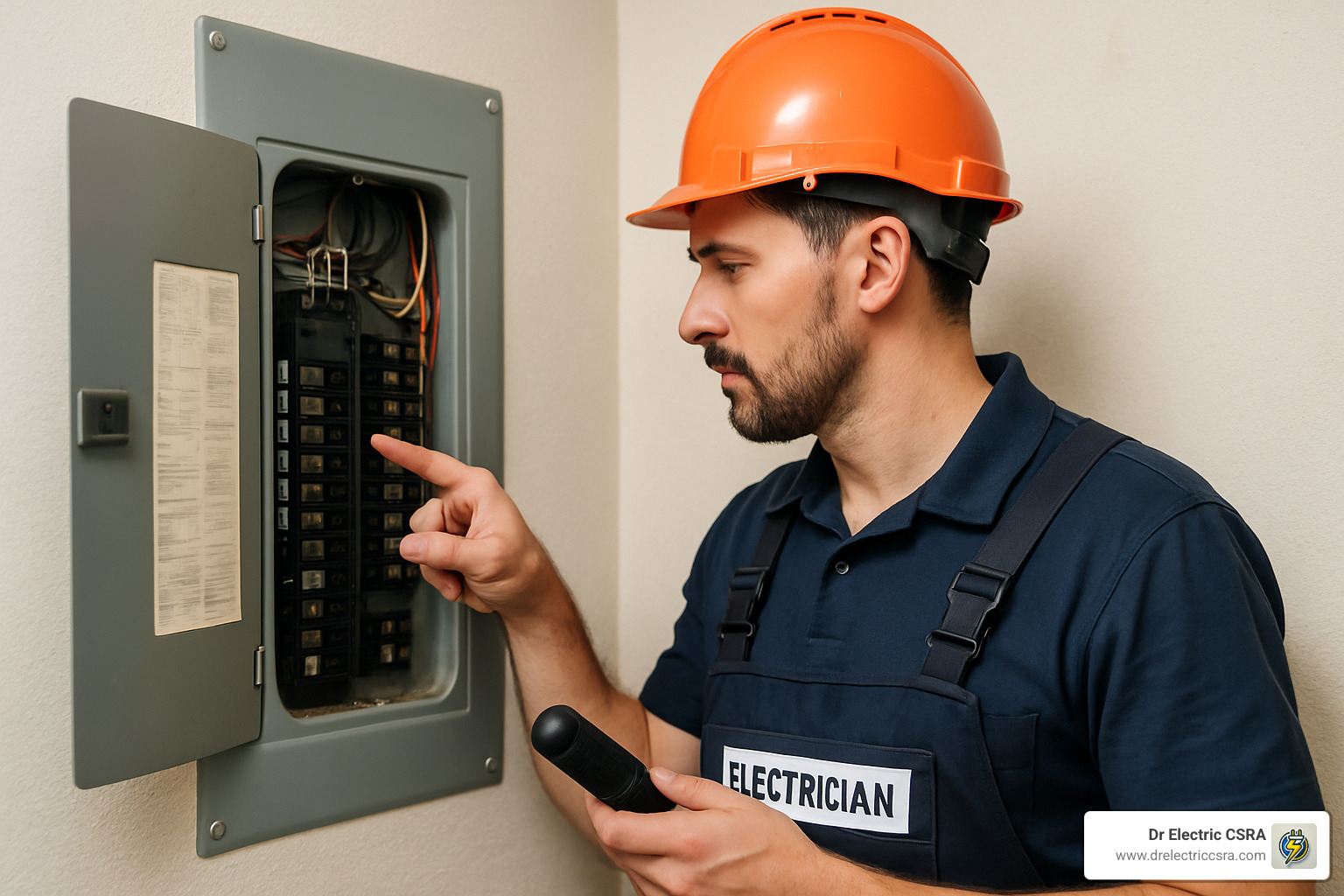
Getting ready for your charging station installation is like preparing for any major home improvement – a little planning upfront saves you time, money, and headaches down the road. Think of this as your safety checklist before we bring the real electrical work to your home.
The good news? You don’t have to figure this out alone. As your licensed electrical contractor, we’ll walk through each step with you, but knowing what to expect helps you make better decisions about your installation.
Assessing Your Home’s Electrical System
Your home’s electrical system is like the circulatory system of your house – it needs to be healthy enough to handle the extra “workout” that comes with EV charging. That’s why we always start with a thorough electrical assessment.
Panel capacity is our first concern. If your home was built before 1980, you might have a 100-amp electrical panel that’s already working pretty hard to power your air conditioning, water heater, and other appliances. Newer homes typically have 200-amp panels, which give us more room to work with.
But here’s the thing – it’s not just about the total capacity. We need to run a load calculation to see how much electrical demand your home actually has. This involves looking at everything from your HVAC system to your kitchen appliances. We’re following the 80% rule here, which means your continuous electrical load shouldn’t exceed 80% of your panel’s capacity.
Let me give you a real-world example: if you want a 40-amp EV charger, we’ll install it on a 50-amp breaker to stay within that safety margin. This prevents overheating and keeps your family safe.
Dedicated circuits are non-negotiable for Level 2 chargers. Your EV charger can’t share a circuit with your garage door opener or workshop tools – it needs its own dedicated 240V line, just like your clothes dryer or electric stove.
Sometimes we find that your electrical panel needs an upgrade. Don’t worry – this isn’t uncommon, especially in older homes. Panel upgrades typically add $500-$2,500 to your project, but they’re essential for safe operation and often required by local codes anyway.
Do I Need a Permit?
Yes, you’ll need a permit for your charging station installation, and honestly, that’s a good thing. I know permits can feel like bureaucratic hassle, but they’re really about keeping you and your family safe.
Safety standards are the main reason permits exist. They ensure your installation meets National Electric Code requirements and local safety standards. These aren’t arbitrary rules – they’re based on decades of electrical safety research and real-world experience.
Here’s something many homeowners don’t realize: insurance coverage can be affected by unpermitted electrical work. If something goes wrong with an unpermitted installation, your homeowner’s insurance might deny your claim. That’s a risk you don’t want to take.
Warranty protection is another consideration. Most EV charger manufacturers require professional, permitted installation to honor their warranties. Skip the permit, and you might void your warranty before you even plug in your car.
When you work with Dr. Electric CSRA, we handle all the permit applications and inspections for you. We know the local requirements in the Augusta area, and we’ll make sure everything is done correctly from start to finish.
Selecting the Best Location
Location planning might seem straightforward, but there are more factors to consider than you might think. The right location can save you money on installation and make charging much more convenient.
Proximity to your electrical panel is probably the biggest cost factor. The closer your charger is to your panel, the less we need to spend on wire runs and conduit. Long runs through finished walls or underground trenching can add significant cost to your project.
Garage installation is usually the best choice when possible. Your charger stays protected from weather, it’s more secure, and it’s typically the most convenient location for daily charging. If we need to install outdoors, we’ll make sure you have proper weather protection and consider factors like snow removal access.
Cable length matters more than you might think. Most charging cables are 18-25 feet long, so we need to position your charger where it can easily reach your vehicle’s charging port no matter how you park. Nobody wants to play “charging cable limbo” every night.
Future-proofing is something we always discuss with our clients. If you’re thinking about a second EV in the next few years, we can plan your installation to make adding a second charger much easier and less expensive later.
The key is thinking through your daily routine and how EV charging will fit into it. We’ll help you find the sweet spot between convenience, cost, and safety.
The Step-by-Step Installation Process
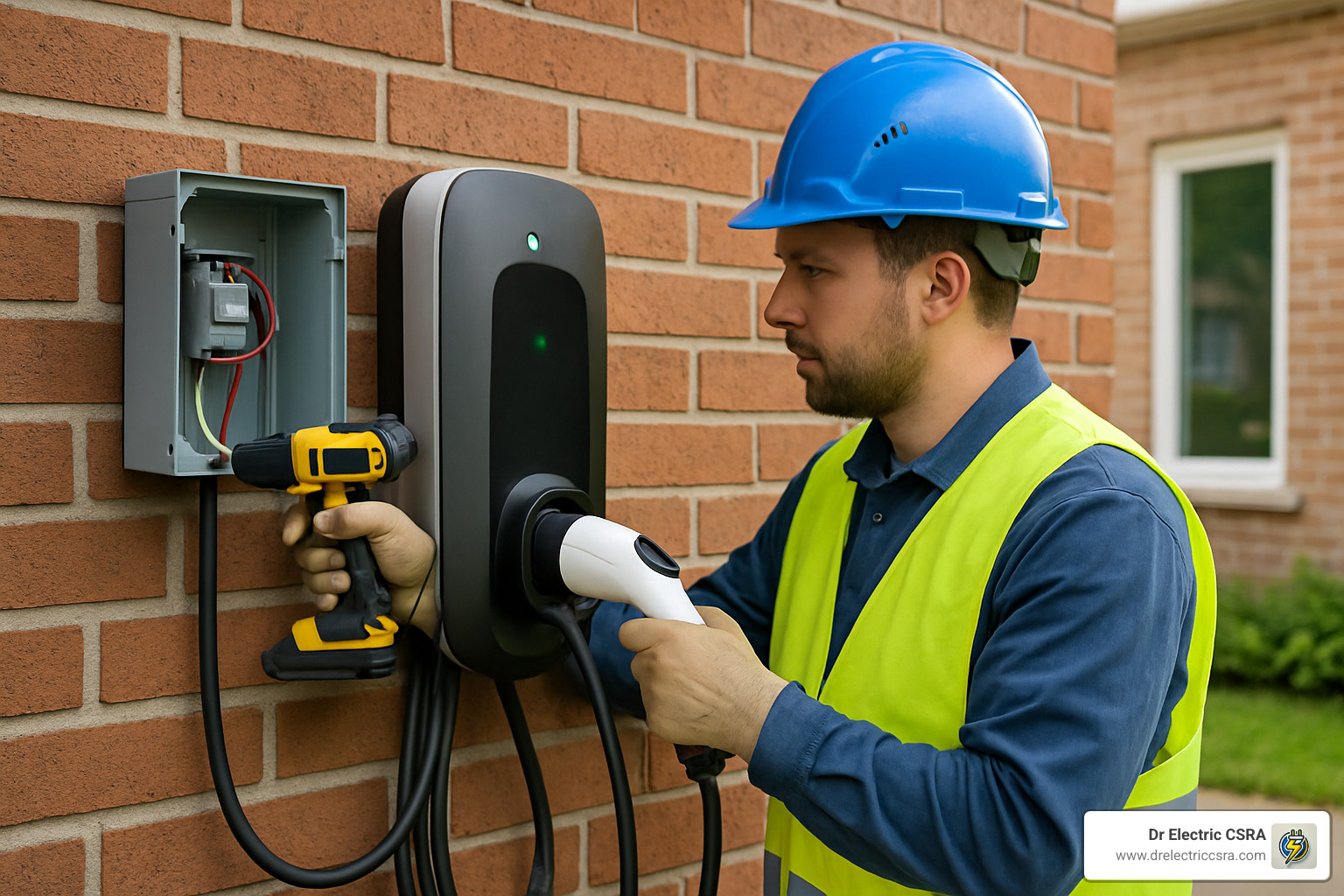
Here’s where the rubber meets the road – your actual charging station installation. After years of installing EV chargers throughout the Augusta area, I can tell you that this isn’t the time to cut corners or try the DIY route. High-voltage electrical work requires professional expertise, and your family’s safety depends on getting it right.
Step 1: Consultation and Equipment Selection
Finding the right electrician for your charging station installation makes all the difference. You want someone who doesn’t just know electrical work, but understands the unique requirements of EV charging systems. At Dr. Electric CSRA, we’ve completed hundreds of EV installations and stay current with the constantly evolving codes and safety requirements.
When getting quotes, don’t just look at the bottom line. Consider what’s included – permits and inspections, warranty coverage, and experience with EV installations. A contractor who’s installed dozens of chargers will spot potential issues that might surprise someone doing their first installation.
Safety certifications matter more than you might think. Only buy chargers with UL (Underwriters Laboratories) or ETL (Intertek) marks. These aren’t just fancy stickers – they mean the charger has been tested for safety and won’t become a fire hazard. You can find a list of recognized certification marks to verify your equipment meets safety standards.
Here’s something many homeowners don’t realize: most manufacturer warranties require professional installation. Try to save money with a handyman or DIY installation, and you might void your warranty before you even plug in your first car.
Step 2: The Professional Charging Station Installation
Professional charging station installation typically takes 4-8 hours, depending on how far we need to run wire and whether your electrical panel needs upgrades. We schedule installations when you’re available for the final walkthrough – you’ll want to understand how everything works.
The actual electrical work involves several critical steps. We start by installing a new dedicated circuit breaker in your electrical panel, sized appropriately for your charger’s amperage requirements. Then we run the proper gauge wire – typically 8-AWG or larger for Level 2 chargers – from your panel to the charging location.
Conduit installation protects your wiring from damage and meets code requirements. Whether we’re running wire through your garage walls or underground to an outdoor location, proper conduit ensures your installation will last for decades.
The final electrical connections are where experience really matters. We’re connecting NEMA 14-50 or 6-50 outlets for plug-in chargers, or hardwiring units directly to the electrical supply. Every connection must be perfect – loose connections cause heat, and heat causes fires.
Every installation must comply with National Electric Code Article 625 for EV charging systems, plus local electrical codes and manufacturer specifications. We also ensure proper grounding and GFCI protection where required by code.
For more details on our installation process, visit our Car Charger Installation page.
Step 3: Testing and Walkthrough
Testing isn’t just plugging in your car and hoping it works. We perform comprehensive safety testing to verify proper voltage and amperage, test all safety systems and GFCI protection, and confirm proper grounding. We also check for any electrical faults that could cause problems down the road.
The walkthrough is one of my favorite parts of the job. We’ll show you how to safely connect and disconnect your vehicle – it’s simple, but there are best practices that extend your equipment’s life. We’ll explain indicator lights and displays so you’ll know if something isn’t working correctly.
If your charger has smart features, we’ll help you set up smartphone apps and Wi-Fi connectivity. Many chargers let you schedule charging for off-peak hours, which can save significant money on your electric bill.
Finally, we arrange for local electrical inspection to ensure everything meets code requirements. This isn’t just bureaucratic paperwork – it’s your protection. A proper inspection confirms your installation is safe and legally compliant, which matters for insurance coverage and resale value.
When we’re done, you’ll have a professionally installed charging system that’s safe, reliable, and ready to serve your family for years to come.
Breaking Down Costs and Open uping Savings
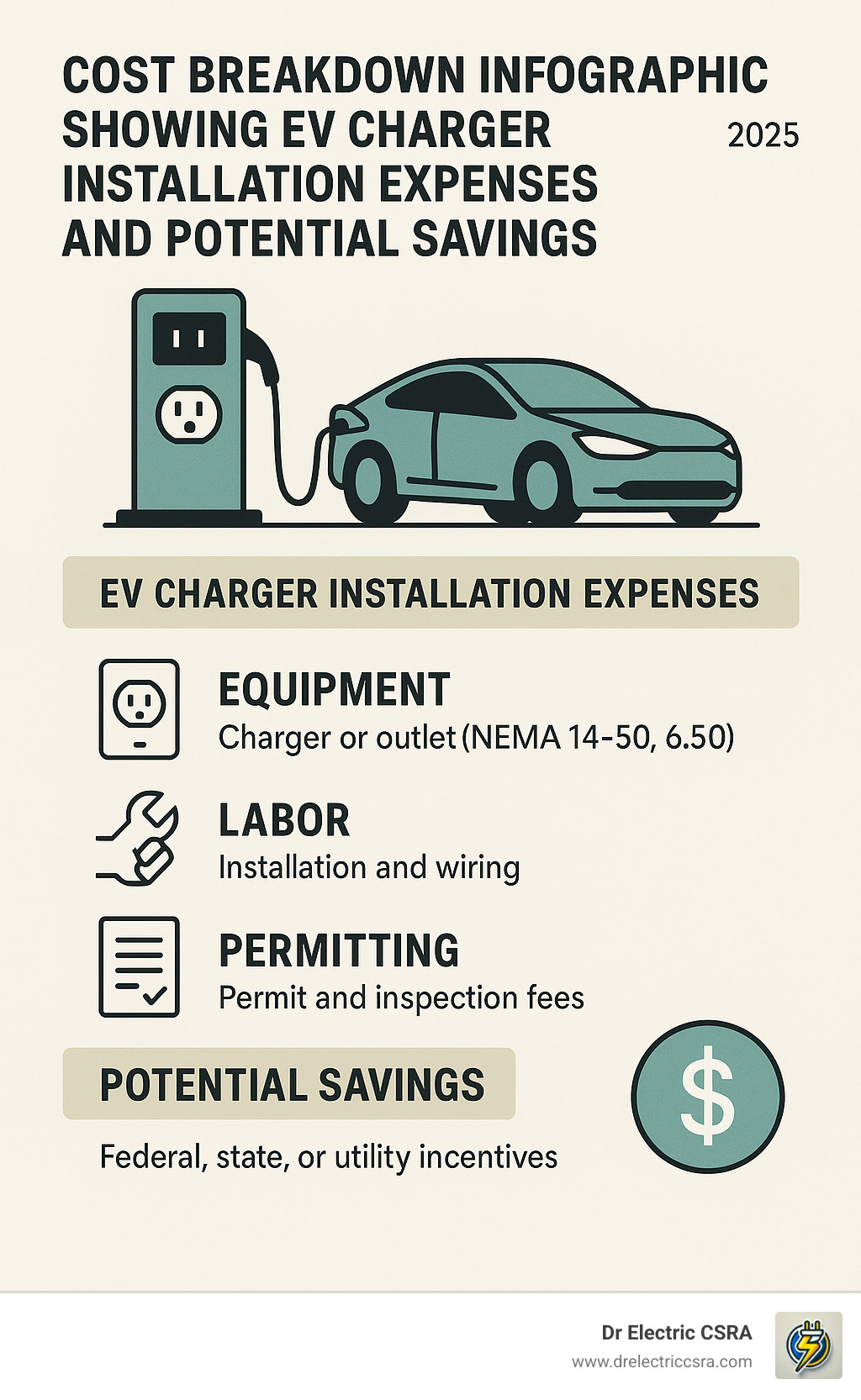
Let’s talk numbers. While charging station installation requires an upfront investment, the long-term savings and available incentives make it surprisingly affordable for most homeowners.
I’ve seen many customers initially surprised by installation costs, then delighted when they find how much they can save through rebates and tax credits. One Augusta homeowner recently told me their installation essentially paid for itself within the first year through fuel savings and incentives.
Factors Influencing Your Charging Station Installation Cost
Your charging station installation cost depends on several key factors, and understanding these helps you budget appropriately.
The charger itself is your first expense. Basic Level 2 units start around $400-$700 and do the job perfectly for most families. If you want smart features like Wi-Fi connectivity and smartphone apps, expect to pay $600-$1,200. The premium units with advanced scheduling and energy monitoring can reach $1,000-$2,000, but they often pay for themselves through optimized charging schedules.
Labor costs typically represent the largest portion of your investment. Professional installation takes 4-8 hours depending on complexity, and you’ll want an experienced electrician who knows EV charging requirements inside and out. This isn’t the time to cut corners – proper installation protects your home and family.
Distance matters more than most people realize. If your ideal charger location is close to your electrical panel, you’re looking at lower costs. But if we need to run wiring across your garage or underground to a detached structure, additional wire runs, conduit, and trenching can add $200-$600 to your project.
Electrical panel upgrades are sometimes necessary, especially in older homes. While this adds $500-$2,500 to your project, think of it as upgrading your home’s electrical capacity for the future. Many homeowners find they needed the panel upgrade anyway for other appliances.
Permit fees typically run $50-$300 in the Augusta area, and we handle all the paperwork for you. Sometimes we need to do minor drywall repair or concrete work, which adds $100-$500 depending on the scope.
Most homeowners invest between $799-$1,999 for complete charging station installation, including equipment and professional installation. That’s roughly equivalent to what you might spend on gas in 3-4 months of driving.
Are There Incentives or Rebates Available?
Here’s where it gets exciting – you’re not paying full price for your charging station installation.
The federal government offers up to 30% tax credit on both your charging equipment and installation costs. That can mean $300-$600 back on a typical installation. Check your eligibility for the federal EVSE tax credit to see exactly what you qualify for.
Georgia offers various state incentives that change throughout the year. We stay current on these programs because they can significantly reduce your costs. Some programs have provided rebates covering up to half of installation expenses.
Local utility rebates are often the most generous. Many utilities want to encourage EV adoption and offer substantial rebates for home charging installations. We work directly with Georgia Power and other local utilities to help you steer these opportunities.
The magic happens when you stack incentives. I’ve seen customers combine federal tax credits with state rebates and utility programs to save 30-50% on their total installation cost. One recent customer in Augusta saved over $800 through combined incentives – their out-of-pocket cost was less than $1,000 for a complete Level 2 charging setup.
The key is applying for these incentives properly and on time. We help our customers identify eligible programs and ensure their installation meets all requirements to maximize savings.
Special Considerations for Apartments and Businesses

Most charging station installation projects are straightforward single-family jobs. Apartments, condos, and commercial sites add a few extra layers of planning, but the payoff can be huge for owners, managers, and drivers alike.
Installing Chargers in Multi-Unit Residential Buildings (MURBs)
Getting approval is often the biggest hurdle. Condo boards and property managers want clear costs, liability coverage, and a simple way to bill residents. We streamline this by providing fixed-price estimates and outlining maintenance responsibilities up front.
• Shared electrical service means load management is critical. We recommend EV Energy Management Systems that balance power across multiple chargers so the building never exceeds capacity.
• Accurate billing keeps everyone happy. Options include dedicated sub-meters or smart chargers that track individual usage automatically.
• Start small, expand later. Installing a few chargers in high-demand spots lets the building test interest before adding more.
For technical and legal details, see this comprehensive guide on EV charging in MURBs.
EV Chargers for Your Business
Whether you run a restaurant, office, or retail store, on-site charging can boost foot traffic and staff satisfaction.
• Attract customers: Drivers will choose businesses where they can top up while they shop or dine.
• Employee perk: Workplace charging shows you value sustainability and can help recruit top talent.
• Potential revenue: Decide whether to offer complimentary charging as a marketing tool or charge a modest fee to offset electricity costs.
• Visible sustainability: Chargers make your green initiatives concrete and measurable for shareholders and guests.
Commercial projects often require higher-capacity panels and ADA-compliant layouts, but incentives for businesses are substantial and can cover a large share of the cost.
In short, the same principles—professional installation, load calculations, and proper permitting—apply to multi-unit and commercial settings. The scale is larger, but so are the benefits.
Conclusion
The convenience and cost savings of home EV charging make charging station installation a smart investment for electric vehicle owners. Over 95% of electric car charging happens at home, and for good reason – it’s the most convenient and economical way to keep your EV ready to go.
Picture this: you pull into your garage after a long day, plug in your car like you would your phone, and wake up to a fully charged vehicle every morning. No more hunting for public charging stations or waiting in line. No more range anxiety about whether you’ll make it to your destination. Just pure convenience and peace of mind.
The cost savings are equally compelling. Home charging typically costs 60-70% less than public charging stations. Plus, with smart chargers, you can schedule charging during off-peak hours when electricity rates are lowest, maximizing your savings even further.
However, charging station installation requires professional expertise to ensure safety, code compliance, and optimal performance. These high-voltage systems demand the same respect as any major electrical appliance. Proper installation protects your home, your family, and your investment – it’s simply not worth the risk of trying to cut corners.
At Dr. Electric CSRA, we’ve completed hundreds of electrical installations throughout Augusta, Evans, Grovetown, Martinez, and the broader CSRA region. Our team of licensed electricians specializes in EV charging station installation, ensuring your project meets all safety codes and manufacturer requirements.
We handle every aspect of your installation with safety and reliability as our top priorities. From comprehensive electrical assessments to permit applications and inspections, we take care of the technical details so you don’t have to. Our professional installation comes with a 5-year warranty, complete testing, and thorough customer education about your new charging system.
The transition to electric vehicles is accelerating, and home charging infrastructure is essential to support this growth. With proper planning and professional installation, your home EV charger will provide years of reliable, convenient service that makes EV ownership truly enjoyable.
Ready to make the switch to convenient home charging? Contact us today for an estimate! Our experienced team will assess your home’s electrical system, recommend the best charging solution for your needs, and provide a professional installation that meets all safety standards and local codes.
Don’t let range anxiety hold you back from enjoying your electric vehicle. With a professionally installed home charging station, you’ll join the millions of EV owners who wake up every morning to a fully charged vehicle and the confidence that comes with knowing your installation was done right the first time.






0 Comments